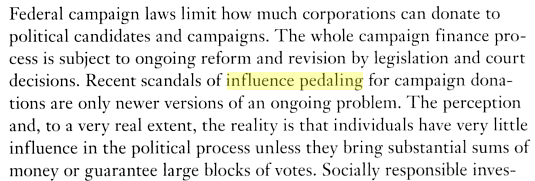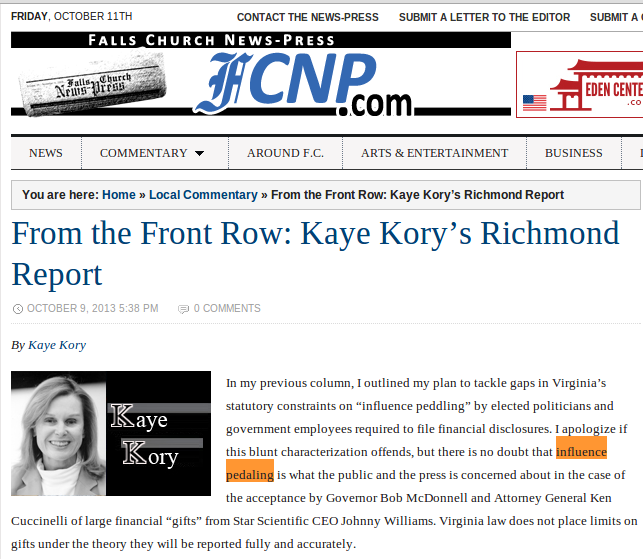Influence pedaling
« previous post | next post »
Steven Croley, "White House Review of Agency Rulemaking: An Empirical Investigation", University of Chicago Law Review, Vol. 70, No. 3 (Summer, 2003):
After all, if the OIRA review process were eliminated altogether, as some critics of activist presidential oversight would seem to favor, some amount of White House influence pedaling would obviously persist.
The Eggcorn Database has backpeddle for backpedal, and soft-peddle for soft-pedal, but not "influence pedaling". There are some jokes on the net about bicycle-promotion as "influence pedaling", e.g. here and here. But there are also quite a few cases of straight-faced eggcorns.
From the Oxford Handbook of Business and Governing:
From The Complete Idiot's Guide to Socially Responsible Investing:
From What Went Wrong:
And here's a case where the original phrase and the eggcorn both occur in the same paragraph of a newspaper column, suggesting either that a copy editor caught one but not the other, or that the writer's fingers just executed "pedaling" even though her brain was thinking "peddling":
The phrase "influence peddling" is apparently more recent than I would have guessed, given the antiquity of the phenomenon and the plausibility of the metaphor involved. The earliest New York Times usage is a flurry of stories starting with H. Walton Cloke, "Vaughan Accused of Trying to Lift Ration Violator's Ban", 8/17/1949:
Maj. Gen. Harry H. Vaughan, President Truman's military aide, was denounced at the "five per center" inquiry today by Senator Karl E. Mundt, Republican, of South Dakota, as a "finagling bargainer and a fumbling bungler" who used "pressure and intimidation" in an attempt to get an Agriculture Department employe to violate the law.
At the same session, Senator Joseph R. McCarthy, Republican, of Wisconsin, demanded that John Maragon, a former government employe and a friend of General Vaughan, be indicted for perjury. Mr. Maragon's name has been mentioned numerous times during the inquiry.
The investigation of "five per centers" is being conducted by an investigations subcommittee of the Senate Committee on Expenditures in the Executive Departments. It wants to know whether the letting of government contracts is affected by "influence peddling."
The OED's earliest citation for influence peddling is a 1972 NYT article, but it gives this for influence pedlar (influence peddler):
1949 N.Y. Times 14 Aug. E7/5 The Investigations subcommittee of the Senate Committee on Expenditures in the Executive Departments which is inquiring into the activities of the ‘five percenters’ and the ‘influence peddlers’ has discovered that selling influence may be unethical, but it is not always illegal.
[Tip of the hat to Nina Mendelson]




James said,
October 11, 2013 @ 5:55 am
Maybe they aren't really eggcorns at all, but just misspellings.
How could we tell?
Jon Weinberg said,
October 11, 2013 @ 6:12 am
A notable thing about the Steve Croley quote that leads the post is that academic law reviews are edited by students, and the student labor — because free — is used quite liberally. That paper went through a whole bunch of separate substantive edits and copy edits and proofreadings; by the time it hit print, a lot of eyes had looked at (or past) that phrase.
Faldone said,
October 11, 2013 @ 6:44 am
We don' need no copy-editor; we got spell-check.
tk said,
October 11, 2013 @ 6:49 am
Speaking of eggcorns v. misspellings, how about in the above:
“Aids to the President and cabinet members were involved in influence pedaling and other criminal activities.”
Shouldn't "aids" have been "aides" ?
tuncay said,
October 11, 2013 @ 7:12 am
@tk – no doubt..
Robert Coren said,
October 11, 2013 @ 10:06 am
I used to see frequent instances of a bumper-sticker, usually on VW bugs, saying "I'm peddling as fast as I can".
I think these are simple misspellings; it's hard to imagine that the people who put the bumper-stickers on their VWs meant to say that they were selling something.
[(myl) Indeed. But "soft-peddling" for "soft-pedaling" is a plausible semantic confusion, given "soft sell" vs. "hard sell". And "influence pedaling" seems to me to be somewhat plausible as well, since there might be some "gas pedal" (or even bicycle-pedal) metaphor involved, dealing with using favors to provide motive power.]
Noah Stanzione said,
October 11, 2013 @ 1:31 pm
It's also possible that in the law review article, it was at one point corrected and then miscorrected back to the original. Or the editors may have been so bogged down in all of the citation minutiae that the proofreading of the text itself was neglected. Or the editors simply trusted the judgment of the author because they didn't want another hissy fit and couldn't afford for the article to be pulled. There are a lot of politics and other considerations that unfortunately go into law journal editing, and a lot of work put on students' shoulders. Judging from the state of many of the articles submitted for our consideration by esteemed law professors, either professors knew their reputations would secure them publication and did not bother trying to write well, or they really were on the whole of marginal writing ability.
ShadowFox said,
October 12, 2013 @ 4:58 am
I've seen it quite frequently in blog comments and not just "influence pedaling", but pedal/peddle and pedaling/peddling in both directions, in more general use. Worse, I've seen a couple of "influence pedaler" as well. Just doesn't seem that unusual of an error. @James–having talked to some of the people who made these mistakes regularly, I am quite certain that it is an eggcorn.
GeorgeW said,
October 12, 2013 @ 5:32 am
One could try to petal influence by sending flowers to a politician.
ThomasH said,
October 12, 2013 @ 6:46 am
Amid the comment, do I understand correctly that the consensus is:
influence peddle (try to sell influence)?
but
back pedal (try to pedal backward)?
Mark Dowson said,
October 12, 2013 @ 8:40 am
I suppose "Soft peddle the influence pedaling" is an instance of the rare double eggcorn
Robert Coren said,
October 12, 2013 @ 11:06 am
OK, as a pianist I automatically know what a "soft pedal" is, but, in light of Mark's reply to my comment, I recognize that this is not so obvious to many (most?) people.
I revise my opinion to a view that some instances of this confusion are or might be eggcorns, but many of them are simple spelling errors.
I'm not convinced about "influence pedaling".
maidhc said,
October 13, 2013 @ 4:50 am
I'm with ShadowFox. I see a lot of peddle/pedal errors in all kinds of contexts.
Mr Punch said,
October 13, 2013 @ 12:52 pm
A lot of people, I'd guess, just don't quite grasp that there are two separate words here, even though they've seen each of them many times. It's like "stationary" and "stationery." Plus which, "pedlar."